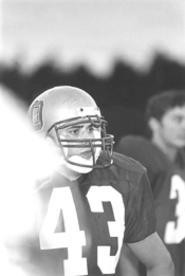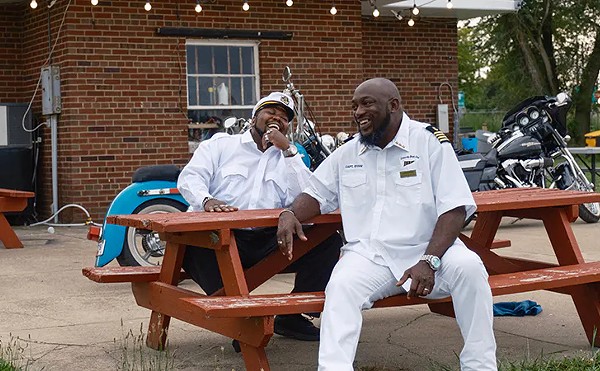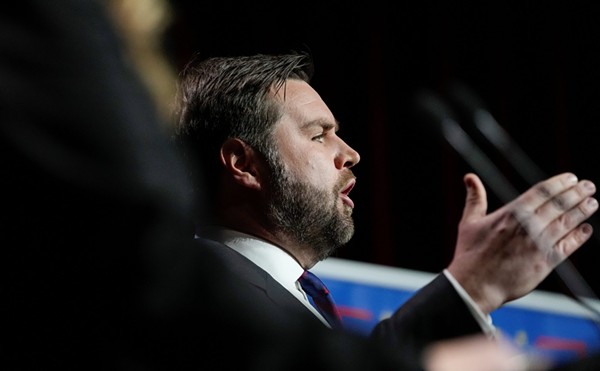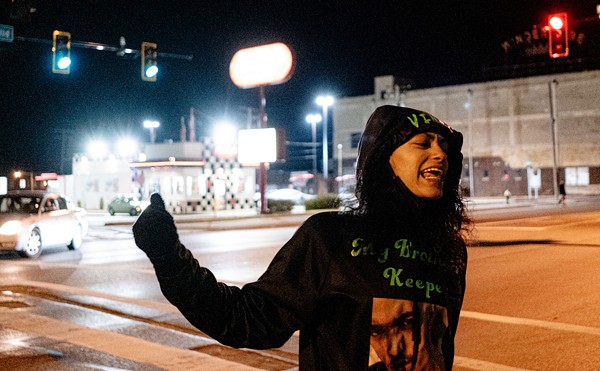Suddenly, the door swung open. Two figures entered his room. One, wearing a glow-in-the-dark hockey mask, moved quickly toward the bed and began hurling punches. "The first time, I was hit in the face," says Harvey. "After that, there was a combination of punching, hitting, and hair-pulling."
Harvey managed to get out of bed and make his way toward the door. Before he could escape, the second intruder pounced, knocking him to the ground. Then, as quickly as they came, the two assailants left. "They never said a word the whole time," says Harvey.
In the few moments before campus security arrived at Barnard Hall, he gnawed on the obvious question. The attack seemed planned, deliberate, as if he'd been singled out. But why? He was an unlikely target -- a big, genial English major only weeks from graduating. There was only one explanation he could summon: This was about his column in The Grape, one of the school's student newspapers.
Over the next nine days, that suspicion proved correct. Four men were arrested. Seniors Ryan Catignani and Richard Kocher were charged with aggravated burglary and assault. Sophomore Nicholas Walker and former student Markeith Reed were charged with complicity to aggravated burglary and complicity to assault.
The motivation for the attack, one student told police, was simple: retribution. "There were comments made by numerous individuals regarding the dislike for the victim and the articles he had written," according to a police report. "In particular, the football players were begrudged by the articles."
All four men involved in the assault, at one time or another, played football for Oberlin College. They were tired of being picked on.
It has not been a good spring for Oberlin. The "Barnard Incident," as it is known, was one of several activities not likely to make the school's next promotional brochure. In March, vandals tore up ceiling tiles, broke light fixtures, and painted graffiti inside Zechiel House, an all-male dorm where numerous athletes live. In April, a woman was raped outside Drag Ball, the high event of Oberlin's spring social calendar.
At a school with an exalted reputation, these were humbling lessons: Even Oberlin has an ugly side.
It goes without saying that Oberlin isn't like most schools. The first college in the country to admit women, a place where black students were accepted 25 years before the Civil War, Oberlin has always put as much emphasis on social edification as intellectual progress.
"Nobody is really willing here to lay down when somebody says, 'You're wrong,' if they truly believe they're right," says junior Rachel Wortman.
At Oberlin, the saying goes, it's tradition to be nontraditional. The school has produced alt-rock queen Liz Phair, wunderkind magazine editor Jane Pratt, and William Goldman, the screenwriter of Butch Cassidy and the Sundance Kid. When Oberlin recently announced that its acceptance rate for next fall's freshman class would be 18 percent lower than the previous year -- meaning more people than ever were applying -- it was not a point of student pride, a nod to the school's prominence. Instead, it sparked concern: The administration was trying to create a "more conventional student body."
Nowhere is this conspicuous otherness more apparent than in the place where convention thrives and conformity reigns: sports. For decades, Oberlin athletic teams weren't just bad. They were an afterthought.
And no activity suffers more than that most mainstream of college pastimes: football. From 1951 through 2000, the school had two winning seasons. There were years when the team did not score 20 points all season. One recent stretch saw the Yeomen win but three games. That stretch was the 1990s.
All of this was supposed to change last fall. With a large batch of incoming freshmen and a gung-ho second-year coach, Oberlin fielded its biggest, most talented team in years. It was going to compete; it was going to win games. When that didn't happen -- the team went 0-10 and extended its losing streak to 39 games -- players became easy targets.
In a school full of headstrong artists, writers, and musicians (Oberlin's conservatory is one of the best in the country), the pathetic plight of athletes -- particularly football players -- was seen by many as poetic justice. It was proof of how far Oberlin had fled from conventional social order. The geeks had inherited the earth.
"I think [some students] dislike the fact that . . . there are these large ogres running around, hitting people for fun and competition," explains David Smolev, a junior safety. "For some people, the esteem of Oberlin is that we're too elite, we're too evolved for such activities."
Catignani -- one of the students charged -- was among the most outspoken critics of Oberlin's anti-jock ethos. "It's so ironic to me, because in a school environment that is supposed to be so nationally renowned for being so liberal and so accepting and so tolerant of everything -- every different race, gender, ethnicity, religion, sexual orientation -- it's OK to discriminate against football players," he said in an interview with Scene last fall ["The Ream Team," November 30]. "And it's only us. We are the only athletic team that people group as 'The Football Team' and have that carry negative connotations."
Such statements would seem patently absurd at most any other school, where athletes ascend to celebrity the minute they step on campus. But at Oberlin, even Harvey concedes a chasm exists. "Especially in the last two years, there sort of has been a divide between certain athletes, mainly the football team, and the rest of campus."
Athletic Director Michael Muska, the first openly gay college AD in the country, noticed as well. In late February, he wrote an article for another student newspaper, The Oberlin Review, in which he coined a term for the situation: sportsphobia. The problem, he wrote, has "been latent over time, but for some reason had reared its head more recently." Muska referred to several athletes who left school after students placed messages on their doors reading "We don't want you here" and "Football is for losers."
"I ask each of you to consider what influences whatever negative attitudes you may have about athletics," he wrote, "and realize that these activities may be just as important to our student athletes as any interests you care about."
It was a shot aimed straight at the meaty shank of Oberlin's identity politics, and it drew predictably vociferous responses in The Review: Sportsphobia didn't really exist. If anything, it was football players engaging in self-imposed exile. How could Muska compare it with homophobia or racism? (This was a common complaint. It didn't seem to matter that Muska never made those comparisons.) "A bunch of bullshit," read one of the more concise rebuttals.
The week after the piece appeared, there was a meeting among students and faculty to discuss the article. Some 50 people were expected. More than 300 showed up.
Muska's case wasn't helped by events of the previous weekend. On February 22, the day before his article ran, a school committee ruled that Zechiel House, the all-male dorm that was home to many athletes, would go co-ed this fall. That weekend, vandals destroyed lighting, ripped out ceiling tiles, and wrote graffiti on the dorm's walls.
Jeff Harvey saw it all as fodder. As a humor columnist for The Grape, an alternative student newspaper, he was an equal-opportunity offender, and some targets were too easy to ignore. Though he'd seen the division between some athletes and their fellow students grow, he felt as many other students did: It was the athletes -- not sportsphobia -- who were largely to blame. "The football team, in particular, takes pride in their 'us against the rest of the campus' separatist stance," he says.
And he soon found out what most writers do: Everybody has a sense of humor, until you write about them. The football team was no different, and Harvey was well aware of the grumbling.
But he couldn't resist. The vandalism at Zeke House and Muska's plaintive missive were just too rich. On April 15, The Grape published Harvey's column with the headline, "Don't Call It a Surprise When the Bullets Start to Fly," in which Harvey predicted that, if a campus shooting occurred, the culprits would surprise no one. "Who are our outcasts? Who are the marginalized misfits of this campus who will soon force their way into the forefront in a spray of bullets . . .? It will be the athletes pulling the triggers."
But, Harvey quipped, students shouldn't necessarily worry, because "when the shooting starts, then just like on the opposing football teams who face the Oberlin College Football Crimson Fighting Yeomen, no one will actually get hit."
"I think that was the one that put people over the edge," says Smolev.
Two nights later, Harvey was awakened by masked guests.
A month later, on April 18, the college's community board -- a quasi-judicial body that metes out sanctions for school policy violations -- recommended that the administration expel Catignani and Kocher, the two students who entered Harvey's room. It also recommended that Walker, the alleged lookout, be given a one-year suspension. (None of the three returned calls from Scene.)
The following week, after an appeal by Kocher and Catignani, a second community board overturned the expulsions. Instead of getting kicked out just weeks before they graduated, Catignani and Kocher would have their degrees suspended for two years. They could still call themselves Oberlin grads; they just had to wait.
The reversal was greeted by howls. The Review called the decision "shameful." Others saw it as an administrative attempt to skirt embarrassment. "I think the school is setting a very bad example by saying, 'Well, you don't like what somebody says or prints, beating them up is an OK thing,'" says Wortman, a friend of Harvey.
In response, students registered their outrage with administrators, alumni, and trustees. They called parents and asked them to express their outrage. They tipped off the media. They held a protest march. In short, they acted like Oberlin students.
It worked. President Nancy S. Dye announced she would review the case. Last week, she ruled that Kocher and Catignani would be permanently expelled. "For many of us, this case and its adjudication have called into question the College's commitment to the safety of its students and its willingness to uphold some of its most fundamental values," Dye wrote in a letter announcing her decision.
Still, it seems no one is completely satisfied. Harvey remains frustrated with the review process, which he believes was far too slow and far too willing to accommodate his assailants.
Muska also remains frustrated. He is considering leaving the school. One reason is that most of his friends and family live on the East Coast. But another is student resistance to his goal of making Oberlin athletics competitive. "Oberlin is very resistant to change," he says. "The classic line people like to use is 'Oberlin people can change the world, but no one person can change Oberlin.'"













